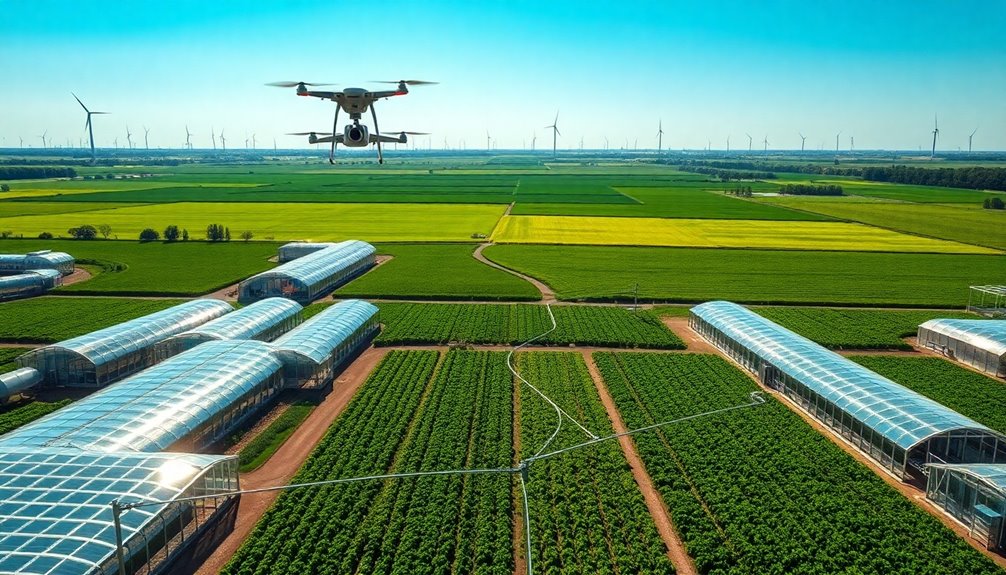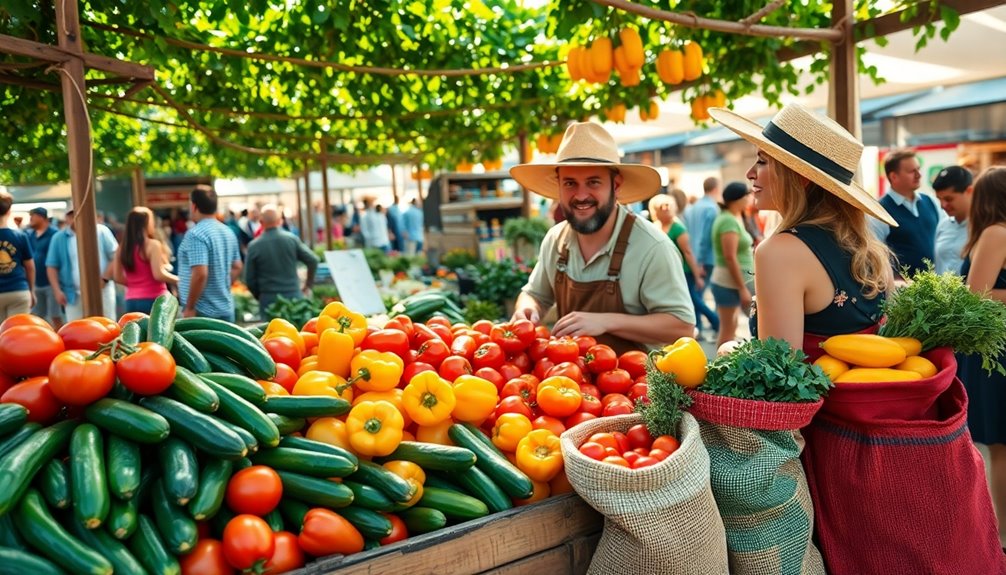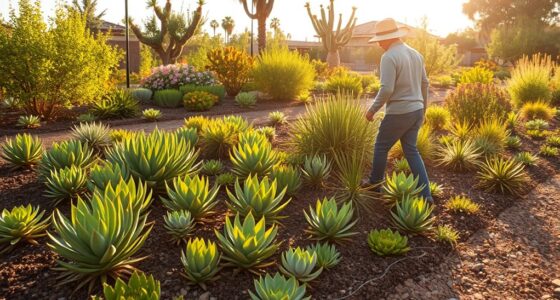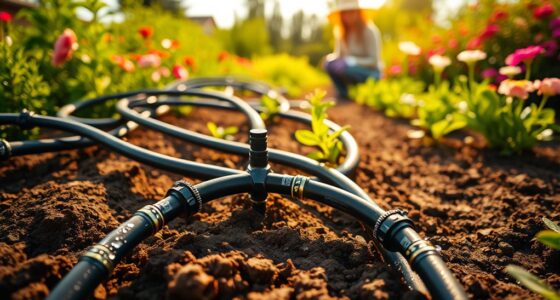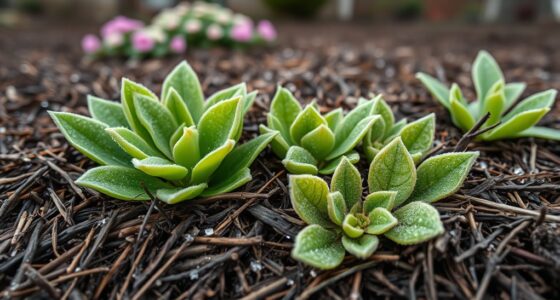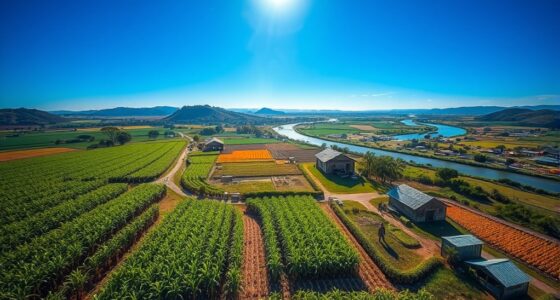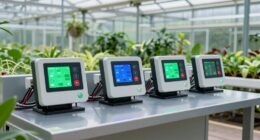In the Netherlands, you'll find innovative agriculture technology that controls crop growing environments with precision. Climate-controlled greenhouses enable year-round production, effectively managing temperature and humidity. Dutch farmers use automation, like drones and driverless tractors, to monitor crops and optimize resources. They've also harnessed sustainable practices, reducing water use by 90% and relying less on chemicals through biological pest control. With advanced seed technology and real-time data collection, the efficiency of crops is greatly improved. If you're curious about how these methods impact global food supply, there's much more to explore.
Key Takeaways
- Climate-controlled greenhouses allow for year-round crop production by regulating temperature, humidity, and light conditions.
- Advanced irrigation systems reduce water consumption by 90% while ensuring optimal moisture levels for crops.
- Automation and real-time data collection enable precise management of resources and crop health monitoring.
- CO2 enrichment and controlled lighting significantly enhance plant growth and yield in greenhouse environments.
- Innovative practices, such as utilizing fish waste as fertilizer, further improve crop productivity sustainably.
Overview of Dutch Agriculture Technology
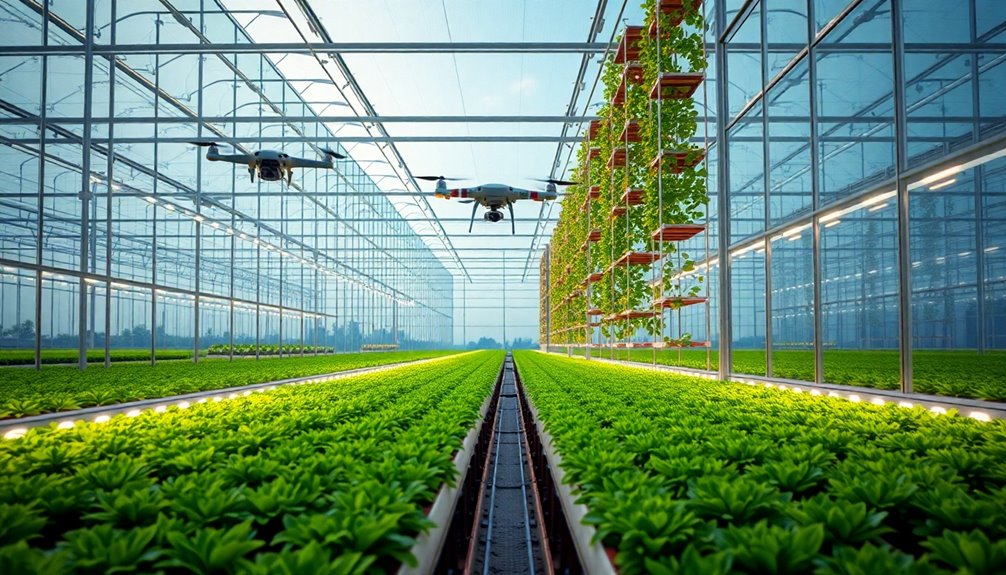
Dutch agriculture technology is often at the forefront of innovation, showcasing a remarkable ability to maximize crop production while minimizing environmental impact.
In the Netherlands, climate-controlled greenhouses enable you to grow a variety of crops year-round, drastically reducing chemical use by 97% and water consumption by 90%. Utilizing advanced technology, such as automation systems for transporting harvested produce and over 150 types of screens, you can effectively manage humidity and light.
The incorporation of CO2 enrichment and precise light control optimizes plant growth, leading to impressive yields, like over 20 tons of potatoes per acre.
Additionally, precision farming techniques, including drones and driverless tractors, enhance sustainability and efficiency in monitoring soil and crop health, reinforcing the commitment to sustainable agriculture.
Innovations in Greenhouse Design
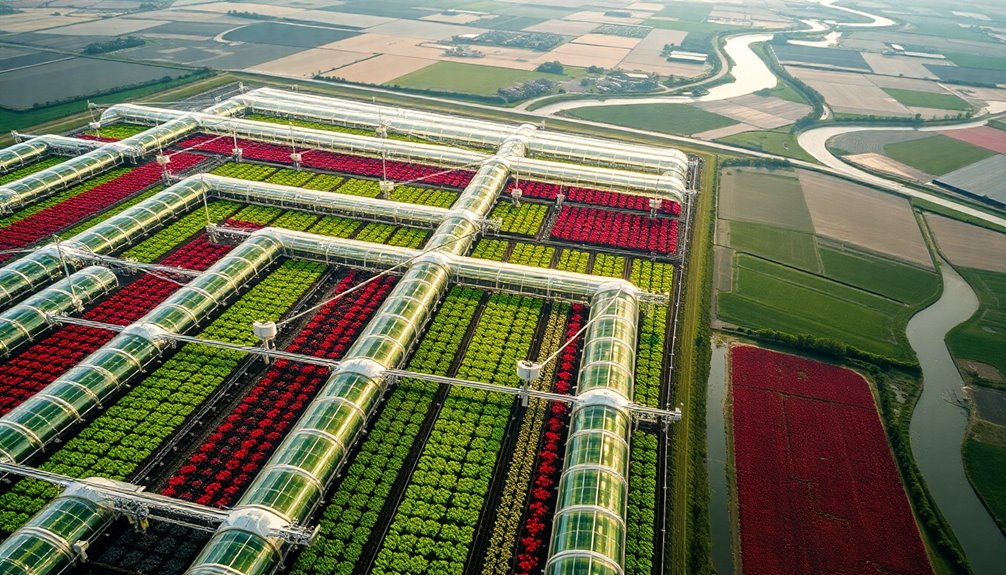
Innovative greenhouse designs play a pivotal role in enhancing agricultural efficiency and sustainability. The Dutch greenhouse industry utilizes advanced technologies, ensuring controlled environments that promote ideal plant growth. These greenhouses, mainly made of glass, can reach heights of 25 to 30 feet, maximizing sunlight capture.
| Feature | Benefit |
|---|---|
| Advanced Irrigation Systems | 90% less water use |
| Biological Pest Control | Reduces chemical interventions |
| Renewable Energy Integration | Supports sustainability |
| CO2 Enrichment Control | Boosts growth rates |
| Automated Harvesting Systems | Enhances operational efficiency |
Precision Farming Techniques
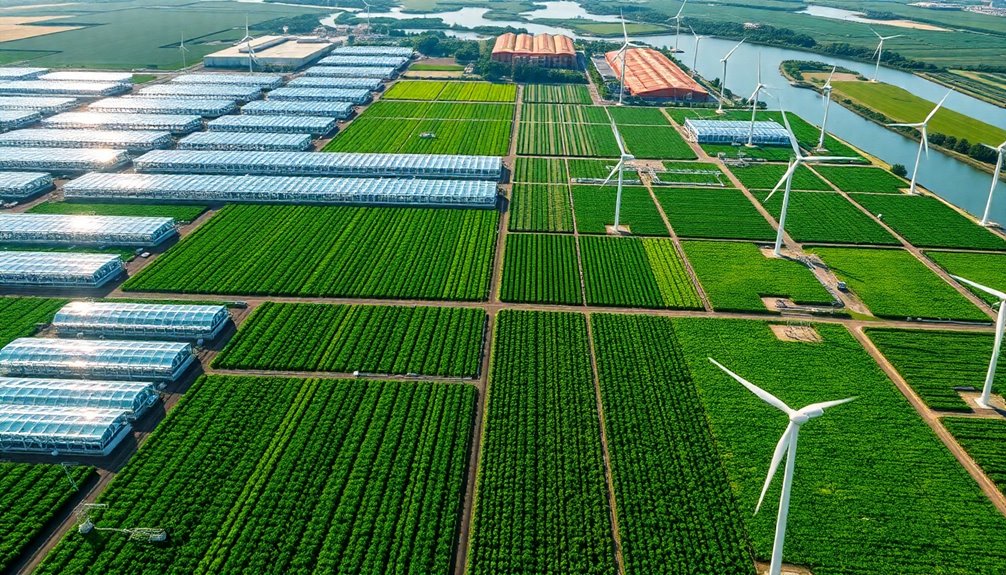
Precision farming techniques are transforming the way you can approach agriculture, making it more efficient and sustainable.
In the Netherlands, you're witnessing potato yields soar over 20 tons per acre, far exceeding the global average. By utilizing drones and driverless tractors, you can monitor soil conditions and crop health in real time, optimizing resource efficiency.
Climate-controlled greenhouses allow for year-round production, while advanced irrigation systems have cut water consumption by 90% compared to traditional methods.
Additionally, innovative practices like using fish waste as fertilizer and bumblebees for pollination not only boost crop yields by 20-30% but also reduce costs.
Embracing these precision farming techniques sets the stage for a more productive and sustainable agricultural future.
Seed Technology Advancements
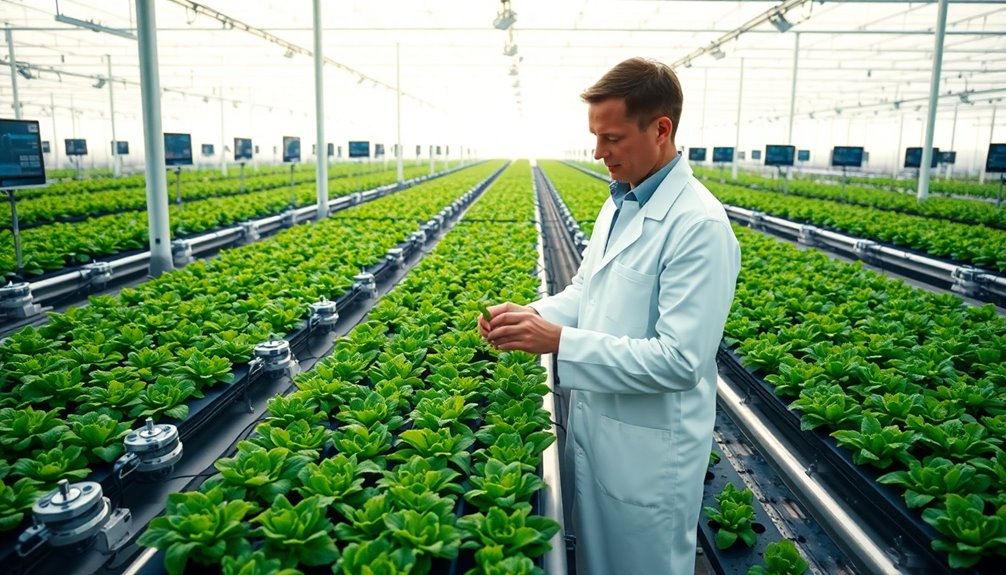
Seed technology advancements are revolutionizing agriculture, offering solutions that boost resilience and sustainability.
Dutch companies like Enza Zaden are at the forefront, investing $100 million annually in research to develop resilient, salt-tolerant vegetable varieties that adapt to climate change.
Located in the Seed Valley region, these innovators introduce around 150 new vegetable varieties each year, greatly enhancing global agricultural practices.
With a focus on advanced breeding techniques, they've improved crop yields and disease resistance in various plants.
Additionally, innovations in seed technology, such as developing seeds that require less water and fertilizer, align perfectly with the Netherlands' commitment to sustainable agriculture, ensuring a brighter future for farming while meeting increasing global demands.
Sustainable Practices in Crop Production
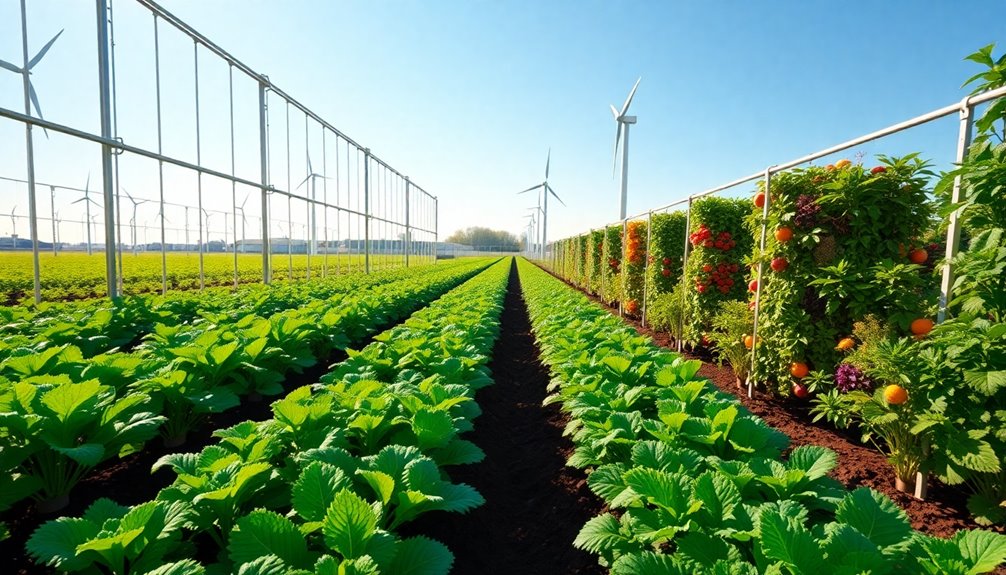
Building on the advancements in seed technology, sustainable practices in crop production are transforming how agriculture operates in the Netherlands.
You'll find that advanced irrigation systems in greenhouse production have led to a remarkable 90% reduction in water dependence for key crops.
By employing biological pest control methods, like Swirsky mites against aphids, farmers minimize chemical use, enhancing food safety.
With over 80% of vegetables grown in Dutch glasshouses exported, their efficiency speaks volumes.
The integration of renewable energy sources, such as geothermal heating, optimizes these greenhouse operations.
In addition, Dutch agricultural firms are committed to 100% water reuse in their irrigation systems, greatly contributing to environmental sustainability and showcasing their dedication to sustainable agriculture.
Furthermore, the use of sustainable practices in crop production aligns with the principles of environmental sustainability, similar to advancements in renewable energy that reduce reliance on traditional methods.
Role of Automation in Agriculture
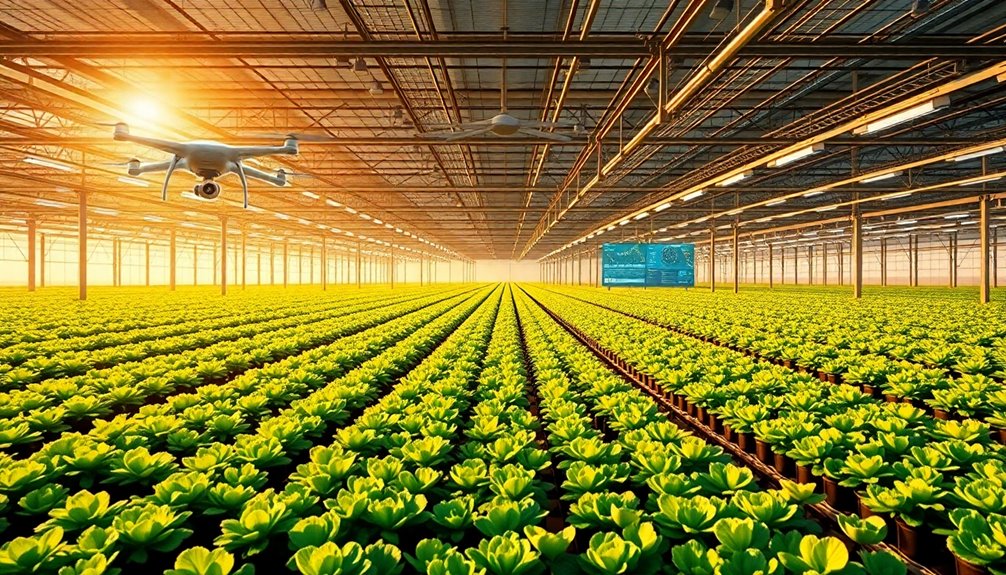
In the world of Dutch agriculture, automation plays a vital role in enhancing crop monitoring systems and resource management techniques.
You'll find that advanced technologies allow for real-time data collection, giving you insights to make informed decisions.
This efficiency not only boosts productivity but also conserves valuable resources, setting a new standard for sustainable farming.
Enhanced Crop Monitoring Systems
Efficiency in agriculture has been transformed by enhanced crop monitoring systems that leverage automation technologies. These systems utilize advanced automation technologies, like drones and driverless tractors, to monitor crop health and soil conditions. By employing controlled environments, farms like PlantLab maximize resource usage and guarantee ideal conditions for growth. Implementing technical SEO practices can also enhance the online visibility of these innovative agricultural technologies.
| Technology | Purpose | Benefit |
|---|---|---|
| Drones | Crop health monitoring | Real-time data collection |
| Driverless Tractors | Soil assessment | Increased efficiency |
| Automated Screens | Humidity control | Precise environmental control |
| AI Integration | Livestock monitoring | Improved animal welfare |
With these innovations, you can see how crop monitoring systems are revolutionizing Dutch agriculture, guaranteeing that every plant gets the care it needs.
Efficient Resource Management Techniques
Automation plays an essential role in efficient resource management techniques within Dutch agriculture. By integrating automated systems in greenhouse operations, you can optimize light capture and CO2 enrichment, enhancing plant growth while minimizing resource use.
Advanced irrigation systems maximize water use efficiency, enabling up to 100% water reuse and reducing overall consumption by 90% compared to traditional methods. The use of over 150 screen types allows for precise environment control, regulating humidity and temperature, which is vital for sustainable agriculture.
Furthermore, semi-automated harvesting and specialized transport equipment streamline operations, ensuring quick processing and distribution of fresh produce. Overall, these innovations create a more efficient and eco-friendly agricultural system that meets the demands of modern farming.
Livestock Management and Welfare
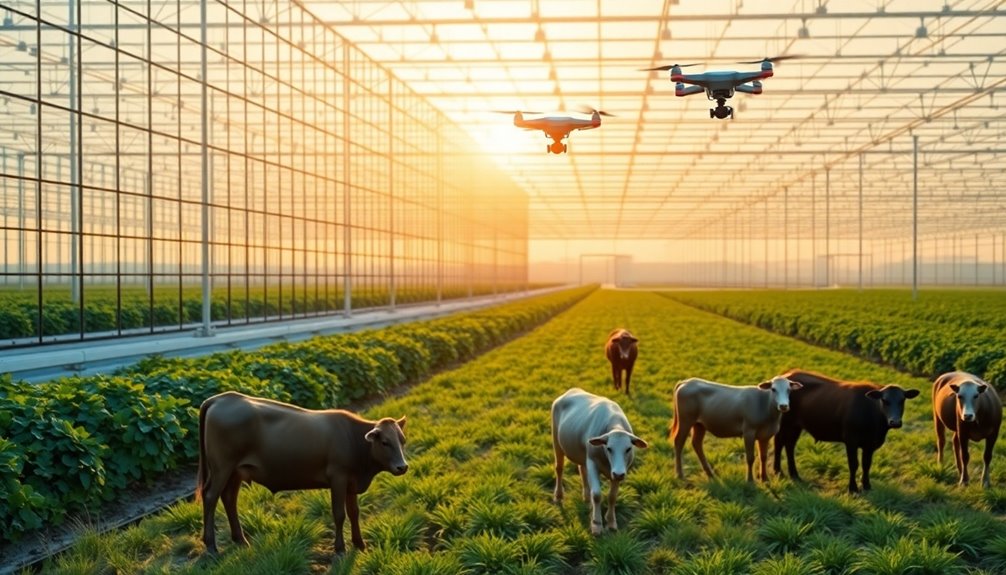
Livestock management in the Netherlands stands at the forefront of innovation, blending technology with ethical practices to enhance animal welfare.
As Europe's largest meat exporter, producing about 4 million cows, 13 million pigs, and 104 million chickens annually, the country emphasizes sustainable practices in livestock farming.
Companies like Vion Food Group utilize AI technology to monitor animal welfare, processing around 20,000 pigs daily.
Meanwhile, Kipster champions ethical chicken farming, focusing on climate-neutral operations and using food waste for feed, while also raising male chicks for meat.
The dairy sector, led by FrieslandCampina, underscores high standards in animal care.
However, intensive livestock farming faces challenges as the government aims to cut nitrogen emissions by 2030, sparking protests among farmers.
Global Impact of Dutch Exports
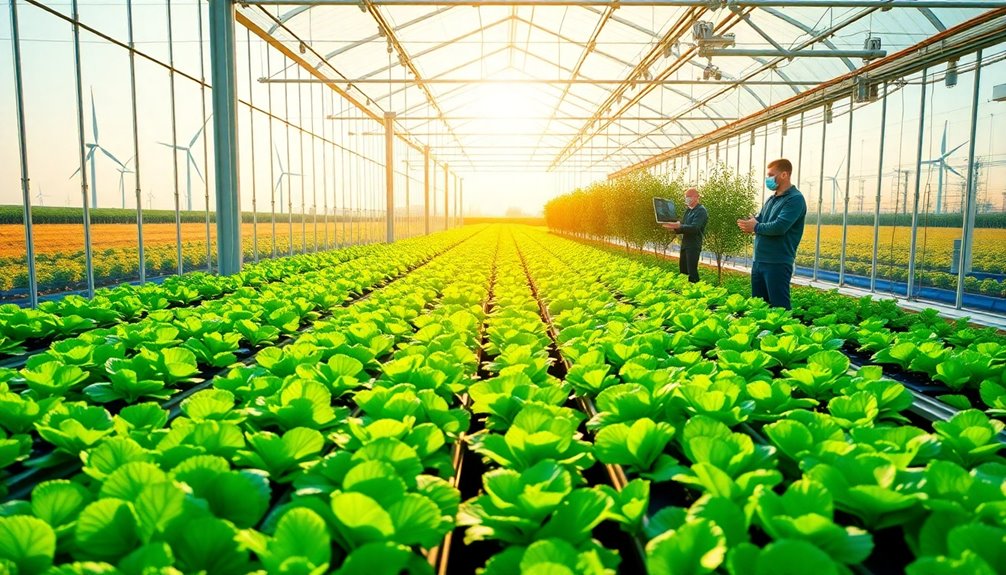
You might be surprised to learn that the Netherlands ranks as the second-largest agricultural exporter globally, with exports markedly boosting food security worldwide.
As you explore the growth of the export market, consider how Dutch innovations in agriculture not only enhance efficiency but also set trends that other countries follow.
This impact goes beyond borders, shaping global agricultural practices and contributing to a more secure food supply.
Export Market Growth
Dutch agriculture has truly taken off in the global export market, establishing the Netherlands as the world's second-largest agricultural exporter by value. In 2021, Dutch agricultural exports reached a record 105 billion euros, fueled by rising prices and increased volumes.
With about 80% of glasshouse-produced vegetables exported, you'll find Dutch produce primarily in markets like Germany and the UK, but also growing in Canada, the Middle East, and Africa.
The Westlands region acts as a hub for agricultural technologies, enhancing collaboration among producers. Innovations such as precision farming and advanced greenhouse systems have boosted both the quality and quantity of exports.
Additionally, the strategic location near Rotterdam port strengthens the Netherlands' role as a critical re-exporter in Europe.
Global Food Security Contribution
The impressive growth of Dutch agricultural exports not only boosts the economy but also plays an essential role in global food security.
By leveraging advanced agricultural technologies, the Netherlands guarantees that food production remains sustainable and efficient. Here's how:
- Dutch innovations like climate-controlled greenhouses reduce water usage by 90%.
- Approximately 80% of glasshouse-produced vegetables are exported, primarily to Germany and the UK.
- The Netherlands is Europe's largest meat exporter, contributing €8.8 billion annually to protein sources.
- Strategic locations like Rotterdam port and Schiphol Airport enhance distribution across Europe and beyond.
These factors highlight how Dutch agricultural exports notably impact global food security, providing reliable access to essential food resources while promoting sustainable agriculture practices.
Frequently Asked Questions
How Does Dutch Agriculture Use Technology to Fully Control the Growing Environment of Crops?
You'll find that technology plays an essential role in controlling the growing environment of crops.
With automated systems, you can manage humidity, temperature, and light exposure precisely.
Advanced irrigation techniques recycle water, cutting consumption considerably.
You'll also see robotics and semi-automated harvesting improve efficiency while minimizing manual labor.
Finally, biological pest control methods reduce the need for chemicals, ensuring a healthier crop production process that maximizes yields and sustainability.
What Are the Agricultural Technologies in the Netherlands?
In the Netherlands, you'll find cutting-edge agricultural technologies that revolutionize crop production.
You can explore climate-controlled greenhouses that optimize growing conditions year-round. With advanced LED lighting and humidity management screens, crops thrive efficiently.
You'll see precision farming techniques, like drones and driverless tractors, enhancing monitoring and yields.
Additionally, innovative practices such as CO2 enrichment and biological pest control contribute to sustainable farming, ensuring high productivity and food safety without chemical pesticides.
What Is the Netherlands Famous for in Agriculture?
You might think the Netherlands is just known for tulips, but it's actually famous for its innovative agriculture.
The country excels in exporting high-quality vegetables and flowers, with over 80% of its glasshouse-grown produce shipped abroad. Dutch farmers lead in sustainable practices, using advanced technologies to maximize efficiency.
They're also pioneers in seed development, creating resilient varieties that thrive under various conditions. This combination makes the Netherlands a key player in global agriculture.
Why Is Dutch Agriculture Critically Dependent Upon Technology?
Dutch agriculture's critically dependent on technology because it maximizes efficiency and sustainability.
You'll find that advanced tools, like climate-controlled greenhouses and precision farming techniques, enable farmers to monitor crops closely and optimize growth conditions.
This reliance on technology helps reduce resource consumption, like water and chemicals.
Conclusion
In the world of agriculture, the Netherlands sets the gold standard with its cutting-edge technologies and sustainable practices. By embracing innovations in greenhouse design, precision farming, and automation, you're not just growing crops; you're cultivating a future where food security thrives. As they say, "the proof of the pudding is in the eating." The success of Dutch agriculture isn't just a local triumph—it's a global beacon guiding us all toward a more sustainable way of farming.

